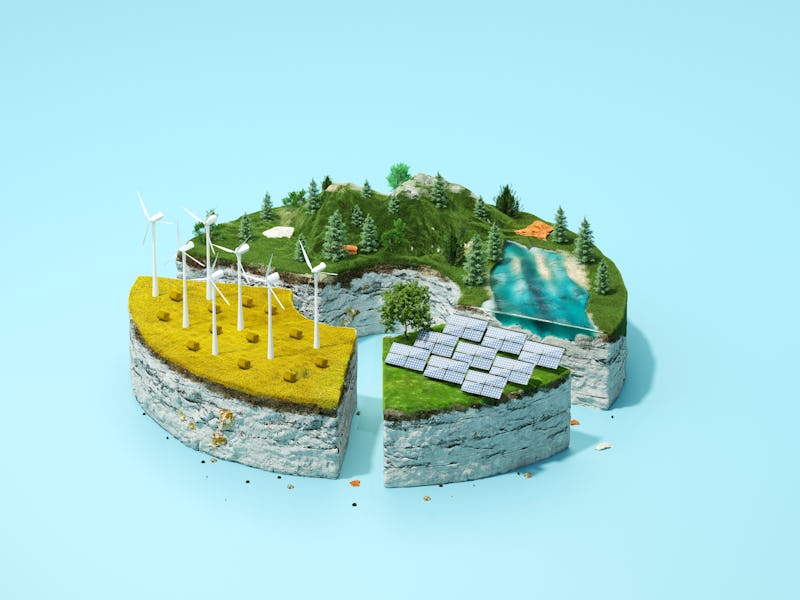How the Ukraine war destroyed Germany's “bridge” to clean energy
The 'Energiewende' relies on gas as a bridge between a coal-powered past and renewable future.

After 16 years under conservative Angela Merkel, Germany gained new leadership late last year. Following a “climate election” that saw the issue surpass Covid-19 as voters’ top concern, Europe’s largest economy is now ruled by a progressive three-party “Alliance for Freedom, Justice and Sustainability” comprising Social Democrats, Greens, and Liberals.
This is the first time the Greens have shared power since 1998-2005, years that saw the acceleration of the “Energiewende” (energy transition), a trailblazing project that has stalled over the past decade. With the party’s co-leaders heading both the foreign ministry and a new economy and climate “super ministry”, many expect Germany to step up efforts to once again lead on climate change and turbocharge the national Energiewende.
Likewise, there are high hopes for Germany’s new chancellor, Social Democrat Olaf Scholz. As Hamburg's mayor, he brought that city’s energy grids back under municipal control to promote renewables following a popular referendum — despite initially opposing the idea — displaying a pragmatic approach to green policymaking. With such figures now at the levers of power, a bolder climate plan appears possible.
Toward that end, the new government approved an ambitious agenda, including objectives by 2030 to phase out coal (eight years earlier than envisioned under Merkel), achieve 80 percent renewable electricity (up from the prior 65 percent goal), earmark two percent of land for onshore wind, and achieve 50 percent climate-neutral heating. It has also set big targets on electric vehicles, train electrification, green hydrogen, and rooftop solar, with the overall aim of reaching climate neutrality by 2045.
“The bridge has collapsed”
Russia’s invasion of Ukraine has made all of this significantly harder to achieve. Germany’s energy transition has for years been predicated on the notion of Russian gas as a “bridge fuel” between a coal-powered past and renewable future, yet supply and sanctions-related concerns linked to the conflict are challenging this strategy.
According to climate state secretary Patrick Graichen, “the bridge has collapsed” as a result of the war in Eastern Europe, which “has broken the narrative of natural gas as a bridging technology”.
Nord Stream 2 construction is complete, but the pipeline remains idle.
The Greens’ participation in government has further undermined the prospect of natural gas as a bridge fuel. The natural gas-skeptic party has long opposed the Nord Stream 2 pipeline between Russia and Germany, with foreign minister Annalena Baerbock lambasting the project as contrary to EU rules even before it was put on ice following events in Ukraine.
A slow decade
Trouble was already brewing well before this, however. Despite impressive achievements into the early 2010s, the intervening period saw missed targets and a slower rate of renewable energy deployment. In a landmark case last year, Germany’s highest court even ruled the country’s 2019 Climate Change Act to be partially unconstitutional for failing to safeguard the rights of future generations.
Brokdorf Nuclear Power Plant was shut down in December 2021, as Germany phases out nuclear power.
Now, just as Germany attempts to simultaneously close all its coal-fired (by 2030) and nuclear (by the end of 2022) power plants, rapidly rising energy prices mean lower- and middle-income households are footing an excess proportion of the Energiewende’s hefty bill. This seriously threatens the project’s popular support.
Calls to boycott Russian oil and gas over Ukraine present another headache for the government. Indeed, economy and climate minister Robert Habeck recently claimed that an overnight embargo on Russian fossil fuels, as part of wider sanctions, would lead to petrol shortages, poverty, and mass unemployment.
Bring back energy democracy?
One solution to Germany’s energy transition woes would draw on the country’s federal system to kick-start progress. German municipalities and states have historically played a pioneering role environmentally, with the Energiewende launched largely thanks to grassroots efforts.
From clean energy cooperatives to citizens’ initiatives pushing for greener municipal- and state-level policies, these experiments in “energy democracy” stemming from the 1970s were buoyed by complementary laws passed at the federal level, particularly in the 1990s and early 2000s. This meeting of bottom-up and top-down approaches provided the foundation for Energiewende’s initial successes.
Over the past ten years, the energy transition has shifted agency and power from enterprising citizens and communities to large corporations, under the federal government’s aegis. As the scope for citizen-driven contributions was curtailed, so too was the pace of the Energiewende. Targets once exceeded now regularly go unmet. To reverse this trend, a national reappraisal seems in order.
From Energiewende to “Zeitenwende”
The war in Ukraine has put a spoke in the wheel here, but it may yet serve to fast-track the Energiewende. A proportionate and graduated Russian energy embargo, intelligently conceived, could present a unique opportunity for Germany to pursue alternative means of powering its energy transition far into the future.
The costs might not be as high as predicted either, with some experts suggesting an embargo could impact the country’s economy less than Covid-19, in the short term leading to a fall in GDP of between 0.5 percent and three percent, compared with a 4.5 percent decline during the 2020 pandemic.
Meanwhile, renewables could be massively expanded to help make up the shortfall, with coal, for example, providing a temporary backup solution (nuclear remains a domestic bugbear).
Ultimately, whether the government’s promises are kept and the Energiewende’s potential is fulfilled remains to be seen. What is clear is that, beyond the immediate risks, this is also a moment pregnant with possibility — a potential “Zeitenwende” (historical turning point) for Germany, Europe, and the wider world.
Posterity will not look kindly if the new government fails to seize this generational opportunity to restore Germany’s climate — and moral — leadership.
This article was originally published on The Conversation by Trevelyan Wing at the University of Cambridge. Read the original article here.
This article was originally published on